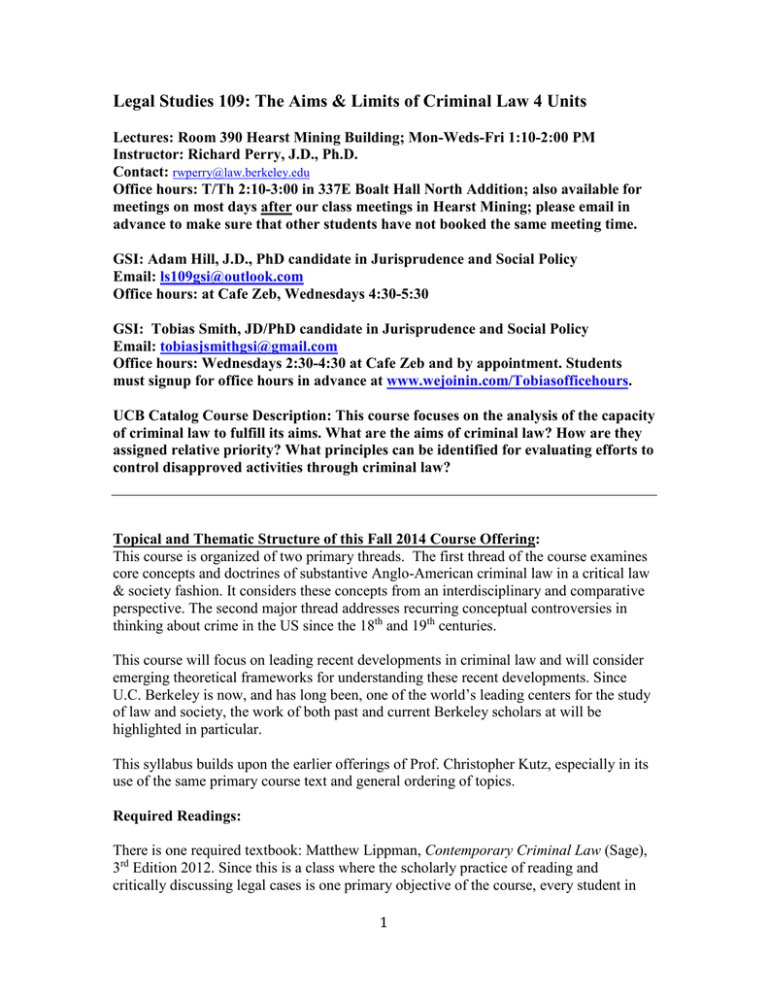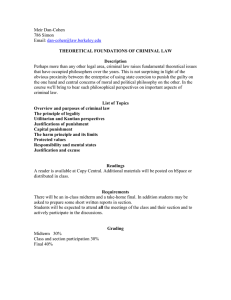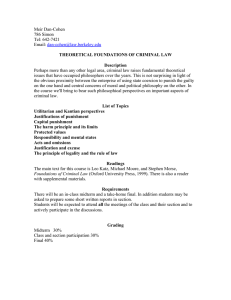Legal Studies 109: The Aims & Limits of Criminal Law...
advertisement

Legal Studies 109: The Aims & Limits of Criminal Law 4 Units Lectures: Room 390 Hearst Mining Building; Mon-Weds-Fri 1:10-2:00 PM Instructor: Richard Perry, J.D., Ph.D. Contact: rwperry@law.berkeley.edu Office hours: T/Th 2:10-3:00 in 337E Boalt Hall North Addition; also available for meetings on most days after our class meetings in Hearst Mining; please email in advance to make sure that other students have not booked the same meeting time. GSI: Adam Hill, J.D., PhD candidate in Jurisprudence and Social Policy Email: ls109gsi@outlook.com Office hours: at Cafe Zeb, Wednesdays 4:30-5:30 GSI: Tobias Smith, JD/PhD candidate in Jurisprudence and Social Policy Email: tobiasjsmithgsi@gmail.com Office hours: Wednesdays 2:30-4:30 at Cafe Zeb and by appointment. Students must signup for office hours in advance at www.wejoinin.com/Tobiasofficehours. UCB Catalog Course Description: This course focuses on the analysis of the capacity of criminal law to fulfill its aims. What are the aims of criminal law? How are they assigned relative priority? What principles can be identified for evaluating efforts to control disapproved activities through criminal law? Topical and Thematic Structure of this Fall 2014 Course Offering: This course is organized of two primary threads. The first thread of the course examines core concepts and doctrines of substantive Anglo-American criminal law in a critical law & society fashion. It considers these concepts from an interdisciplinary and comparative perspective. The second major thread addresses recurring conceptual controversies in thinking about crime in the US since the 18th and 19th centuries. This course will focus on leading recent developments in criminal law and will consider emerging theoretical frameworks for understanding these recent developments. Since U.C. Berkeley is now, and has long been, one of the world’s leading centers for the study of law and society, the work of both past and current Berkeley scholars at will be highlighted in particular. This syllabus builds upon the earlier offerings of Prof. Christopher Kutz, especially in its use of the same primary course text and general ordering of topics. Required Readings: There is one required textbook: Matthew Lippman, Contemporary Criminal Law (Sage), 3rd Edition 2012. Since this is a class where the scholarly practice of reading and critically discussing legal cases is one primary objective of the course, every student in 1 this class is REQUIRED to bring this book to every class meeting. Therefore we want to assist you to find one as easily as possible. This textbook can be purchased at the ASUC and other campus-area bookstores for roughly $100. It can be purchased as an e-book. But it can also be bought online for a considerable savings (prices range around $83 on Amazon.com). The edition assigned is the most recent one, so you can expect to sell it back later, with its resale value depending on its condition. The campus bookstore will also rent a copy to you for around $53. There will be a number of supplementary readings on made available on bSpace. Student Responsibilities: Attendance: Students are expected to attend all lectures and section meetings having already prepared any readings or assignments. Your participation in both lectures and sections will count significantly toward your final grade. Classroom expectations: The topics of this course include many subjects which can be expected to generate strong feelings and emotions. It is a statistical fact that some members of the class are likely to have been victims of violent crimes; at the same time, other members of our class may themselves have experienced false suspicions directed against them. All students are encouraged to offer their own questions, comments, and experiences, as well as to respond to those expressed by other students. Maintaining an effective and inclusive discussion space in class, however, requires all of us to act with respect for and sensitivity toward everyone in the room. Plagiarism: According to the College of Letters and Sciences: All written work submitted for a course, except for acknowledged quotations, must be expressed in the student's own words. It must also be constructed upon a plan of the student's own devising. Work copied without acknowledgement from a book, from another student's paper, from the internet, or from any other source is plagiarized. Plagiarism can range from wholesale copying of passages from another's work to using the views, opinions, and insights of another without acknowledgement, to paraphrasing another person's original phrases without acknowledgement. The submission of such work will, under University rules, render the offending student subject to an F grade for the work in question or for the entire course, at the discretion of the instructor, and will also make the student liable for referral to the SJA. Special Needs Due to Disabilities: If you have special needs due to disabilities we will make every effort to accommodate them. For University policies regarding students with disabilities, and federal and state law affecting people with disabilities, see: http://access.berkeley.edu/ . The student has the responsibility to inform the professor or GSI during the first week of the term, along with providing the appropriate documentation from the DSP Office. 2 Evaluation and Grading: Tests will be designed to draw together concepts and materials from the entire course. Tests will be comprised of multiple choice, short answer, and/or essay questions of modest length. The three midterm tests will add up to 60% of the course grade. The format of the first and the third midterms (on Oct. 13th and Dec. 2nd) will be in-class, with short-answer and/or multiple-choice questions (bring a green Scantron form on these dates). The second midterm will be a take-home essay format, due in class on Monday Nov. 10th. The final exam will also be a take-home format. The final exam prompt will be distributed after the review session during RRR Week and must be submitted at or before our university-assigned exam time of Wednesday Dec. 17th 7:00-10:00 PM. The final will count for 30% of the total grade. Class participation -- i.e., coming to class already having read the assigned material and then participating in the class discussion -- is required of ALL students and will count for 10% of the grade. This 10% of the course grade will include participation BOTH in lecture and in weekly discussion sections. Attendance and participation at weekly discussion sections is similarly expected. Short weekly one-sentence quizzes will be administered in lecture and short written assignments designed to enhance students’ understanding of key concepts may be required by the GSI in section meetings and included in the final course grade. If a student needs to have a test or other course activity rescheduled to an earlier date because of a conflict between the course schedule and a day of religious observance, the student must inform the professor of this conflict before the end of the first week of the term. Course Outline: List of Topics and Readings (Students should expect minor adjustments to this schedule from day to day, in accordance with the pace of class discussion; the scheduling of guest lecturers is also an evolving process) Part I: On Concepts of Crime, Law, and Modern Constitutional Governance: The Classical Frameworks Introduced and Contrasted Week of Sept. 3rd and 5th: Introduction to the course and to the instructors. Introduction to key terms and concepts in the study of crime, law, criminology, and criminal justice. Conceptualizing crime and criminal justice in the modern state. The lectures will summarize much of Lippman Ch. 1 and the appendix on case analysis. How do we recognize and assess harm and crime – and how can we distinguish harms and crime from one another? Index crimes and “crime rates.” Read Lippman Ch. 1 and Ch. 2. 3 Week of Sept. 8th, 10th, and 12th: Here we (re)consider constitutional framework of crime, criminal law, and criminal justice process (“due process” and other processes) with a particular emphasis on theories of general deterrence, utilitarianism, questions of legitimacy of state violence and punishment; classical and contemporary theories, policies, and practices of punishment; the criminal justice system and policies and ongoing controversies. Read Lippman Ch 2 and Ch 3. View portions of “Twilight: Los Angeles.” On the boundaries of the person, the community – the police, and the sovereign powers of the state. Part II: A Critical Law & Society Overview of the General Part of Substantive Criminal Law Doctrine Week of Sept. 15th, 17th, and 19th: Discussion of Lippman Ch. 4 – Actus Reus; criminal acts and omissions. The principle of harm and criminal acts. Recommended dupplementary Harcourt reading. Week of Sept. 22nd, 24th, 26th: On mens rea volition and other modes of culpability. Read Lippman Ch. 5. Discussion of the evolution and influence of the Model Penal Code. Recommended supplementary Dubber reading on bSpace. Week of Sept. 29th, Oct. 1st, and Oct. 3rd: Ch 5 continued; materials for discussion of duties to others that may give rise to criminal culpability. Discussion of strict liability and regulatory offenses. Week of Oct. 6th, 8th, and 10th: Begin Lippman Ch 6, on complicity and parties to crime. How is criminal culpability apportioned among multiple persons? Begin Lippman Ch 7 – on inchoate crimes. What justifies penalizing a failure to cause harm? Recommended supplementary Kutz reading on bSpace. Week of Oct. 13th, 15th, and 17th: Oct. 13th Midterm I In-class Test: Bring SCANTRON Form Weds. Oct. 15th & Friday Oct. 17th: Continue reading Ch 7 and discussion of Inchoate crimes. Week of Oct. 20th, 22nd, and 24th: Lippman Ch 8 – Affirmative defenses. What burdens of proof may fall upon the accused under what circumstances? What principles may justify harmful acts that are otherwise criminal? Week of Oct. 27th, 29th, and Oct 31st: Ch 8 – Affirmative defenses, justifications continued. Begin Lippman Ch 9 – on excuses and mitigation. Do certain circumstances and/or particular accused individuals merit exculpation or other considerations for harms 4 they cause? Further on bSpace: recommended Harcourt reading on prediction and dangerousness. Week of Nov. 3rd, 5th, and 7th: Read Lippman Ch 10. What are the meanings of life in homicide doctrine? Of taking life intentionally and/or otherwise? Where are the sociolegal boundaries between living persons, fetal persons, and the homicide victims? Week of Nov. 10th, 12th, and 14th: Monday Nov. 10th TAKE-HOME MIDTERM II: To be submitted in class period Part III: What is “special” about the “Special Part” of the Substantive Criminal Law? Governing Life-spaces through Criminal Law, Cultures of Control Readings for Nov. 12th and 14th Begin Lippman Ch 11– on crimes of sexual conduct and other harms to the dignity and autonomy of the person; on the troubled history of gendered personhood in the criminal law. Risks of relationships and pervasive gender disparities; supplementary reading on “the relationship penalty.” Week of Nov. 17th, 19th, 21st: Lippman Chs. 12 & 13: On the notion of “home” in criminal law. Crimes against habitation; dwelling as a space of autonomous personhood, protected by criminal law. On the “properties” of crime: Lippman Ch 12 continued. Begin Lippman Ch 13 – the properties of property, places, spaces, and things. Week of Nov. 24th: On “vice and victimless crimes” against community. The ShiftinM Boundaries of Law and Morality between Self and Society: Read Lippman Ch 15 – on crimes against public order and morality, their shifting definition. Supplementary Zimring & Harcourt reading on “vice and victimless crime” Thanksgiving Break Nov. 26th and 28th! Week of Dec. 1st, 3rd, 5th: IN-CLASS MIDTERM III on Monday Dec. 1st Bring Scantron form Read Lippman Ch. 16: Crimes against the State; supplementary readings on bSpace RRR WEEK: Monday Dec. 8th Review for final exam. Review session date and location to be finalized by Campus; Take-home final prompt distributed after review session WEDNESDAY, DEC 17, 2013 7-10 PM: Final Exam Date Assigned by the Registrar Students unable to meet this exam schedule should notify the instructor by the 2nd week so that a reasonable accommodation can be arranged. 5



